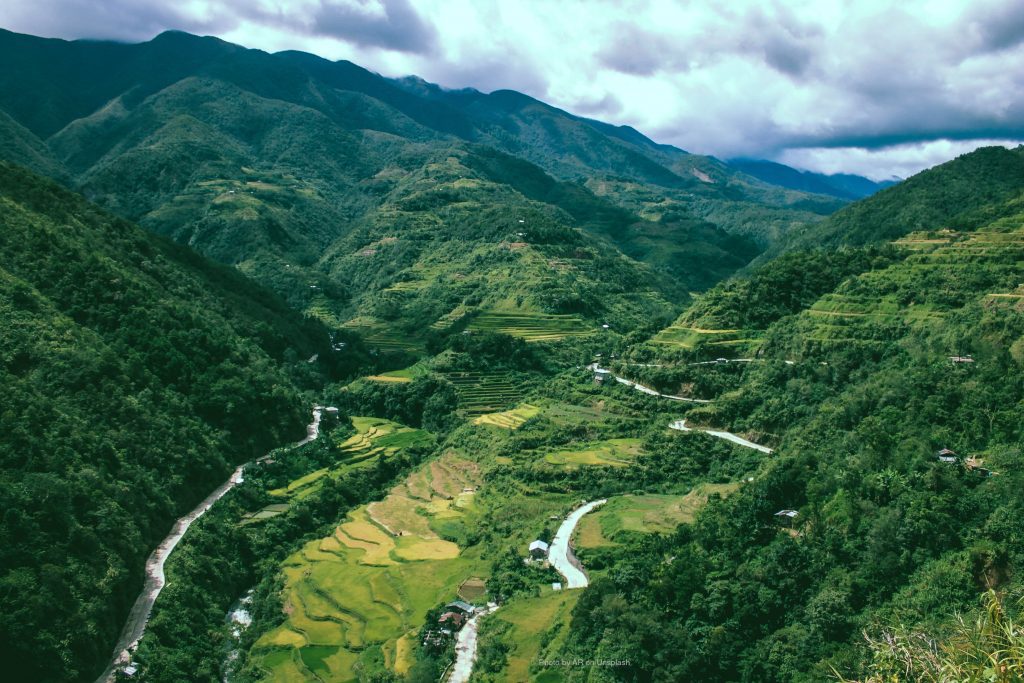


Giselle Morales has written a brief description drawn from the original article: Egongot Tribal Development and an NGO as a Catalyst for Sustainability by Ronnie Amatorio, Marilyn Dela Torre, Marivic Pajaro, Mark Raquino, Paul Watts, and Erica Zafra. This article can be found in the Center for World Indigenous Studies Fourth World Journal Winter 2020, Volume 19, Number 2.
The Egongot tribe—also known as the Bugkalot or Ilongot tribe inhabits the southern Sierra Madre and Caraballo Mountains in the Philippines. The Philippines is recognized for its biodiversity and diversity of indigenous peoples (over 100 different ethnolinguistic groups). In the Philippines, there is a national awareness that most citizens are descendants of indigenous peoples. As a result, the 1997 Indigenous Peoples Rights Act (RA 8371) was passed. This act states that Indigenous Cultural Communities/Indigenous Peoples (ICCs/IPs) have the right to practice and revitalize their own cultural traditions and customs, are entitled to the recognition of the full ownership and control end protection of their cultural and intellectual rights, and have access to biological and genetic resources as well as indigenous knowledge related to the conservation, utilization, and enhancement of these resources.
In this paper, the authors discuss the potential contribution of indigenous philosophy to global sustainability measures asserting that a significant part of the challenge is the need to actualize the United Nations Declaration on the Rights of Indigenous Peoples within the jurisdictions of specific countries. In the Philippines, indigeneity is defined more by community of residence and traditional livelihoods, rather than heritage alone.
Amatorio, Dela Torre, Pajaro, Raquino, Watts, and Zafrathat suggest that approaches to poverty mitigation and tribal development that support global sustainability is best advanced through the implementation of the catalyst role by Non-Government Organizations (NGOs) providing a case example demonstrating this assertion through a project with the Egongot Tribe of Aurora Province.
“The catalyst role of the local NGO includes optimizing the potential for consensus and best practice transfer across the indigenous groups within the Sierra Madre mountains. However, all actions and development need to be based upon the community-identified goals and objectives.”
Through the Community Conservation Area (ICCA), the communities were able to engage in the planning process from situational analysis to defining of the vision, mission, goals, and strategic plans. The communities were able to create plans of financial and organizational management that took into consideration their ecological resources and cultural heritage:
“For this community, the project provided a progression in local ownership and valuation of their cultural heritage through a two-way learning process with Daluhay. Further, the ICCA highlighted the knowledge systems and practices of the Egongot and provided a template for how youth can also embrace their previously eroding culture. Legacy and valuation renewal regarding the Ancestral Domain was particularly evident in the youth participants.”
To read more about this project, read, Egongot Tribal Development and an NGO as a Catalyst for Sustainability in the Center for World Indigenous Studies Fourth World Journal Winter 2020, Volume 19, Number 2.
Ronnie Amatorio is an Egongot artist and a local traditional knowledge expert. He shares his passion for passing on Indigenous knowledge systems and practices to the younger generations through his artworks of paintings, artefacts and handicrafts that showcase the rich culture of his Egongot roots. Ronnie’s project role focused on community facilitation where he took the lead in the engagement of the communities or settlements that were directly engaged in the currentproject as well as project coordination.
Marilyn Dela Torre is a member of the Dumagat Tribe from Dibut, San Luis, Aurora. Her Indigenous roots and heart are close to the forests. Marilyn is determined to help empower marginalized sectors and conserve natural resources. She started of as a volunteer in Daluhay as she pursued her degree and earned a license in Forestry before landing a research position. Marilyn, also a Rainforest Trust Fellow provides technical assistance on tree nurseries, rainforestation, and resource inventories.
Dr. Marivic Pajaro has built her career based upon her early work at the University of the Philippines-Marine Science Institute and the Haribon Foundation before obtaining her doctoral degree at the University of British Columbia. Central to her work is recognizing and facilitating the role of local people in resource management and secondly, actualizing the scaling-up of the ecological approach for sustainability. Leading the project, Marivic serves as the Executive Director of Daluhay.
Mark Edison Raquino role as Daluhay’s Research and Development Coordinator applies his background in environmental management and tropical marine ecosystems management. Mark is also part of the team that helps build capacity for local and Indigenous communities for resource management and governance. Mark was formerly one of the ASEAN Youth Biodiversity Leaders and is currently a Fellow of the Rainforest Trust working on Ancestral Domains and biodiversity conservation.
Dr. Paul Watts, President of Daluhay, has a background in Wildlife Biology and sociology. This perspective evolved into an Ethnoecology Program through the University of Manitoba with a focus on involving indigenous leaders as co-instructors. In 2004, he expanded his life-long interest in volunteering to work on international development. Paul met Dr. Pajaro while training at the University of British Columbia and together they
established Daluhay.
Erica Zafra’s passion for stray animals evolved into a concern for other living beingsas she learned about the global illegal wildlife trade. Erica majored in Geography at the University of the Philippines learning about the interconnections between people, wildlife, and the environment, and where she developed more as an environmental advocate through GIS and Remote Sensing. Erica currently serves as a Daluhay project manager in Northern Aurora.
The library is dedicated to the memory of Secwepemc Chief George Manuel (1921-1989), to the nations of the Fourth World and to the elders and generations to come.
access here